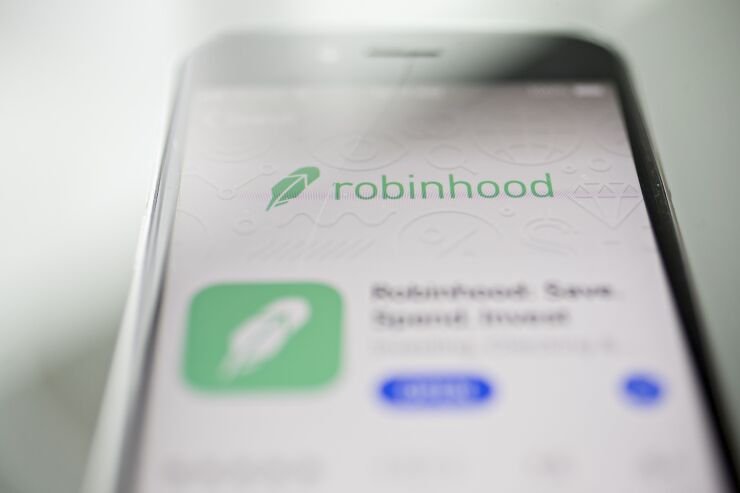If Robinhood Market's
So says Jay Zigmont, founder of the Water Valley, Mississippi-based advisory firm Childfree Wealth. Zigmont, who specializes in providing financial advice to clients without children, said he struggles to get his clients — many of whom are young and run their own businesses — to think about saving for retirement. For those who are self-employed, he'll often recommend they consider a
But there's something about the term 401(k) that tends to make clients think, "that's the old-school boring stuff," Zigmont said.
Maybe Robinhood — with its reputation for digital innovation — can break through, he said.
"I think the thing we need to remember about Robinhood and apps like it is that they speak a different language," Zigmont said. "They market themselves differently than a lot of financial products. And that's not a bad thing."
Robinhood became known for disruption in 2015 when it introduced its app allowing users to make commission-free stock trades. Now the company is seeking to make waves in the retirement industry. It announced on Dec. 6 that it had opened a
Although Robinhood has been rocked by some recent controversies — including that its commission-fee model encourages reckless "gamified" trading on the stock market — its appeal to the young remains strong. Among its 23 million users, the average age is 32. Its new retirement plans are being pitched to so-called "gig" and other non-traditional workers with no access to employer-provided 401(k)s and who also tend to be young. A
Robinhood has tried to distinguish its traditional IRAs and Roth IRAs from retirement plans offered by Charles Schwab, Fidelity Investments, Vanguard Wealth Management and similar firms by offering a 1% match for every dollar contributed. In other words, a person who puts $6,500 in one of the Robinhood plans next year — the maximum allowed for someone under 50 — would get an additional $65.
But those matches come with an important caveat. Contributors have to keep their money in the plans for at least five years or Robinhood can take the matched amounts back. And people who withdraw money from any traditional IRA before reaching 59 ½ — not just one offered by Robnihood — are also subject to a 10% penalty in addition to owing taxes on whatever they take out.
Sarah Paulson, founder of Appleton, Wisconsin-based Valkyrie Financial, said she's worried customers who are drawn to Robinhood because of its reputation may not be aware of those drawbacks to removing money. Paulson, who specializes in advising millennial women, noted that it hasn't been uncommon for investors who've made big profits using Robinhood's stock-track profits to be surprised by big
That's why financial advisors still have a big role to play in making sure clients are going into these investments with their eyes open, Paulson said. She said she would have to look at least at 20 rival retirement options — weighing their individual costs and benefits — before even considering Robinhood.
"It really comes down to what they're offering," Paulson said. "It's what kind of fees they are charging and what kind of investments they are allowing."
Stephanie Guild, the head of investment at Robinhood, said Robinhood's ability to take back its 1% match if a client removes money from an IRA within five years is an advantage that should encourage long-term investing. That is, after all, what retirement saving should be about, she said..
Guild added that Robinhood has gone to great lengths to provide investors with information about how IRAs work and when money can be removed without penalty. She said Robinhood's website contains both easily digestible tutorials and links to IRS pages with detailed descriptions. And she noted that clients will be able to pick funds and stocks on their own or rely on advice from an automated
Robinhood's RIA plans will allow investors to put money into both stocks and exchange-traded funds, which track individual indexes or commodities and trade like stocks. It is eventually also seeking to allow investments into stock options, which confer on their owners the right to sell them a set price on a predetermined date.
Rather than replace financial advisors with such services, Guild said, Robinhood is seeking to reach workers who might not be among the high net worth individuals who tend to get the most attention.
But there's not necessarily anything about being wealthy that makes a person more likely to plan for retirement. Meghan Railey, a founder of Austin, Texas-based firm Opta Capital, said she specializes in working with high net worth and ultrahigh net worth clients — people with $25 million or more. Most of them are entrepreneurs and are among the first generation in their family to be wealthy. Many are too busy to put a lot of time into thinking about what they'll be doing once they step away from their businesses.
"You can't conceptualize that you might need this in 30 years," Railey said. "You are just grinding to make ends meet when you start a company. You're going month to month, and you are just looking at your bottom line."
Railey agreed that Robinhood's IRA plans, if they really do lead more people to think about retirement, probably are a "net positive." Still, she shares some common concerns about the company, including that it has helped "gamify" the stock market by making it too easy to place rapid, risky bets.
"So gig workers will need to come to this with some financial education," she said.
Zigmont said it's a misconception that gig workers are all poorly paid. Some of his clients make six figures a year on the side as social media influencers. Others, though, simply supplement their household income running a cupcake shop, designing video games or teaching music lessons. They will all want to retire some day, Zigmont said. It's part of an advisor's job to make sure they are in a position to do so comfortably, whether they are enthusiastic about saving or not.
"The stuff that Robinhood is doing, at least they are trying things. And there's something to that," he said. "Now, they may not be doing it the right way. That's a different question. But we as financial advisors could learn something here about how it's important to break out of the old mindset."








